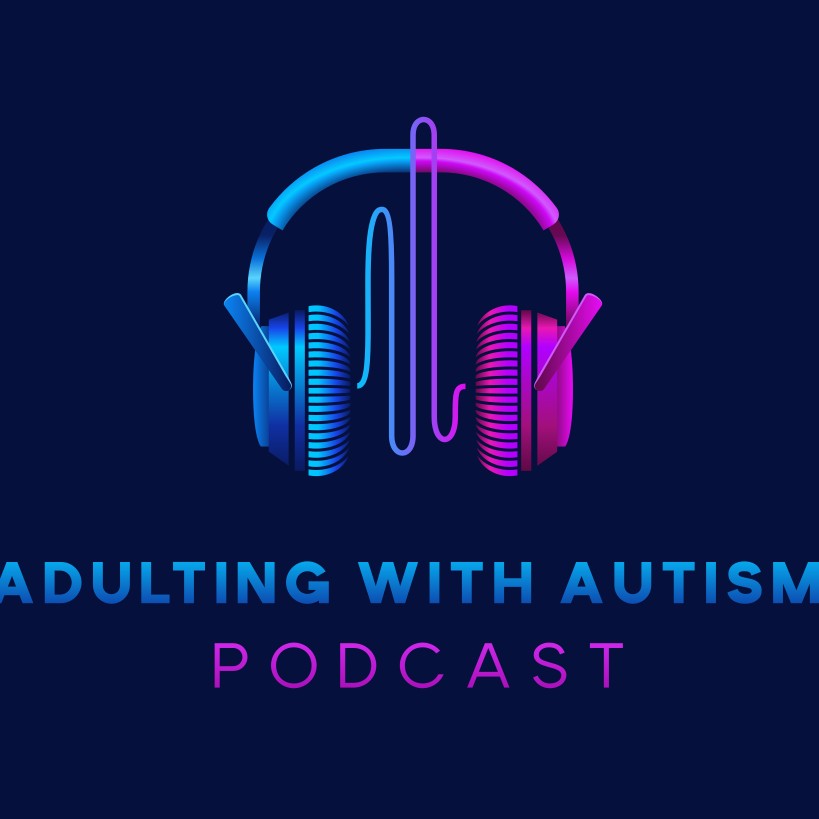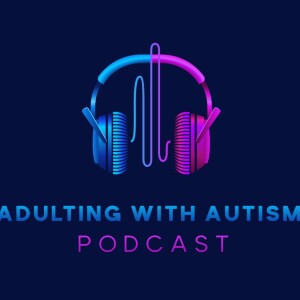
2M
Downloads
145
Episodes
🎙️ Adulting with Autism – 2 MILLION DOWNLOADS & GROWING! 🚀 https://buymeacoffee.com/adultingwithautism Navigating adulthood as an autistic individual comes with unique challenges and triumphs. Hosted by April Ratchford, an autistic occupational therapist, this podcast is your go-to resource for independent living, career growth, relationships, and self-advocacy. 💡 Featuring Exclusive Interviews with Leading Experts & Advocates: 🎙 Dr. Robert Melillo – Neurodevelopmental expert & author (Disconnected Kids). 🎙 Amanda Ralston – Founder of NonBinary Solutions & neurodiversity advocate. 🎙 Thomas D’Eri – Co-founder of Rising Tide Car Wash, a social enterprise empowering autistic individuals. 🎙 Shell Mendelson – Career coach helping neurodivergent professionals find fulfilling careers. 🎙 Sam Mitchell – Host of Autism Rocks and Rolls, sharing powerful personal insights. 🎙 Doug Blecher – Autism advocate and creator of impactful neurodiversity content. 🎙 Steve Gallegos – Speaker and mentor focused on empowering individuals with disabilities. 🎙 McCracken Poston Jr. – Attorney in the landmark Truman Show Delusion case. 🔜 Upcoming Interviews: 🎙 Dr. Matt Zakreski – Clinical psychologist specializing in neurodiversity. 🎙 Dr. Foojan Zeine – Psychotherapist & expert in emotional wellness. Join 1.1M+ listeners worldwide! Tune in every Wednesday & Saturday for expert insights, real-life stories, and strategies for thriving as an autistic adult. 🎧 Listen now on Podbean, Spotify, Apple Podcasts & YouTube! 📩 Follow for updates & behind-the-scenes content! 🔥 #AdultingWithAutism #Neurodiversity #AutismPodcast #1MillionDownloads #AutisticVoices 📌 New Episodes Every Wednesday & Saturday 🔗 Follow, Subscribe & Listen:https://feed.podbean.com/adultingwithautismpodcast/feed.xml 📢 Let’s Talk! Connect with us on Instagram & YouTube:https://linktr.ee/adultingwithautism Want to be a guest on Adulting with Autism? Send April Ratchford a message on PodMatch, here: https://www.podmatch.com/hostdetailpreview/1708097947800879cbdd654ca
Episodes

Wednesday Jan 29, 2025
Redefining Respect: Julie Pham's Seven Forms Framework
Wednesday Jan 29, 2025
Wednesday Jan 29, 2025
Hey guys, hey! Happy Wednesday! How are you holding up for the midweek? It's hump day! As January winds down, whether you've stuck to dry January or decided it's not for you, we get it. We're all just trying to start the year right, even if it means navigating a few bumpy roads. And speaking of navigation, today's episode is a real treat as we dive into the fascinating world of workplace dynamics.
Join us for a lively chat with the brilliant Julie Pham, an award-winning business leader with a best-selling book, who is here to guide us through her revolutionary Seven Forms of Respect framework. She’s got a knack for making us rethink how we see respect and inclusivity at work, mixing her personal journey with impactful storytelling.
Get ready as Julie shares her thoughts on balancing personal and professional lives, understanding respect in all its forms, and navigating workplace culture with grace. She opens up about her Vietnamese heritage, offering insights that provoke thought and reflection. Let’s tap into ways we can recognize respect is relative, ask better questions, and be leaders regardless of our roles.
So grab your drink of choice and settle in for an enlightening and eye-opening conversation on Adulting with Autism. And remember, you only have two more days to go until you can enjoy your beloved drink if you're counting down the days of dry January. Welcome to the podcast, Julie!
https://www.facebook.com/curiositybased
https://twitter.com/curiositybased
https://www.instagram.com/curiositybased/
https://www.linkedin.com/company/curiositybased

Saturday Jan 25, 2025
🎙️ Mastering Goals with No-BS OKRs: Featuring Sarah Lobkovich
Saturday Jan 25, 2025
Saturday Jan 25, 2025
Happy Saturday, friends! 🎉 As January wraps up, how are those New Year's resolutions coming along? If your goals feel like overwhelming mega-tasks, don’t worry—I’ve got just the episode to help you turn it around.
This week, I’m joined by Sarah Lobkovich, a former strategy executive turned powerhouse coach and author. Sarah’s on a mission to revolutionize goal setting with her No-BS OKRs method—a practical, no-nonsense approach to turning busywork into real, meaningful results.
In this episode, we cover:
✅ How to streamline your goals and focus on what really matters.
✅ Strategies for leaders and teams to achieve big results without the burnout.
✅ A sneak peek into Sarah’s upcoming books: The No-BS OKRs Workbook and You Are A Strategist.
✅ Bonus: Sarah’s high-speed hobby as a professional motorcycle road racer 🏍️!
Whether you’re leading a team or tackling personal goals, Sarah’s insights will give you the tools to crush it—without the chaos.
📅 Tune in now and take the first step toward a more focused, productive year!
🔗 https://linktr.ee/adultingwithautism
Book- You Are A Strategist: Using No-BS Objectives and Key Results to Get Big Things Done
Workbook-The No-BS OKRs Workbook
https://www.facebook.com/redcurrantco
https://www.youtube.com/@redcurrantcollective
https://instagram.com/redcurrant_co
https://www.linkedin.com/in/saralobkovich
https://www.tiktok.com/@saralobkovich

Wednesday Jan 22, 2025
🎙️ Unlocking Neurodivergent Potential: Insights from Kate Paullin
Wednesday Jan 22, 2025
Wednesday Jan 22, 2025
Happy Wednesday, friends! Are you ready to work smarter, not harder? This week, we’re exploring how to align with your brain's unique strengths instead of fighting against it. 🌟
Join me as I chat with Kate Paullin, a certified coach and mentor for neurodivergent individuals. Kate shares her personal journey of discovering her own neurodivergence, how it transformed her life, and actionable strategies for embracing your authentic self.
In this episode, we dive into:
✅ The systemic challenges of financial support for neurodivergent young adults.
✅ Navigating grants and scholarships for greater independence.
✅ The power of intuition, emotional regulation, and celebrating your strengths.
✅ Thriving in a neurotypical world without compromising your individuality.
Kate’s story is a testament to breaking molds, honoring your energy, and crafting a life that fits you. Whether you’re neurodivergent or supporting someone who is, this episode offers invaluable insights and encouragement.
🎧 Tune in and let’s keep adulting—together!
🔗 https://linktr.ee/adultingwithautism
📅 New episodes every Wednesday and Saturday.
🔥 Follow for more inspiration and strategies for navigating life as a neurodivergent adult.
https://www.facebook.com/followthedopamine.fb
https://www.followthedopamine.life/

Saturday Jan 18, 2025
Finding Your Sweet Spot in the Workplace
Saturday Jan 18, 2025
Saturday Jan 18, 2025
Hey guys, hey! Happy Saturday! 😊 It's the weekend, and I am here for it. But we've got a real talk on our hands today about jobs. So often, we hear "my job hates me" or "I hate my job." But maybe, just maybe, it's not about the job itself but the environment you're in.
Join us as we chat with Aimes Hyde, who took the brave step of leaving her path to becoming a doctor because of her sensory struggles and found a supportive work environment in a crisis center. Discover her inspiring journey and how she managed to find her sweet spot, doing something she loves without sacrificing her mental health.
Learn why it's essential to find a job environment that accepts you for who you are and supports your well-being. And don't forget, you're not stuck forever – changing your job environment might be just what you need to thrive.

Wednesday Jan 15, 2025
Wednesday Jan 15, 2025
Hey there! 🌟 In this heartfelt and enlightening episode of Adulting with Autism, we’re joined by the inspiring Malumir Logan—an accomplished leader with two decades of experience in policy change, advocacy, and education. As an ambiguously racialized and neurodivergent individual, Malumir shares her powerful journey of breaking barriers and creating impactful change in a world still striving for equality.
Together, we dive into the challenges faced by parents of neurodivergent young adults, exploring expectations for independence, self-advocacy, and the importance of personal agency. Malumir offers a unique perspective on how collective action and conversation can lead to meaningful policy changes and better support systems for neurodivergent individuals.
Whether you’re a parent, educator, advocate, or ally, this episode delivers valuable insights and actionable strategies to empower yourself and others. Join us for a candid chat full of personal stories, practical advice, and a warm, inclusive vibe.
Don’t miss this empowering conversation—tune in now and let’s create change together! 🎙️💡
https://www.linkedin.com/in/malumir-r-logan/

Saturday Jan 11, 2025
Saturday Jan 11, 2025
Hey, guys. Happy Saturday! I hope you're all staying warm and safe from the winter storms, unlike us here in Kentucky wishing for less snow! 😂 Today, I upgraded to some fancy light blue headphones, and I'm feeling tech-savvy. But let's cut to the chase - it's not about headphones; it's about money, money, money!
We're diving into an essential topic: making your money work for you! Whether you love spending it or are trying to save more of it, nobody really teaches us how to manage it, right? Well, don't worry; that's exactly what this episode is all about. My guest, the amazing Bill Barnett, shares simple steps for money management that both you and your parents can use.
Bill, a pro in the business world, breaks it down from budgeting and savings accounts to investments without getting too complicated (no talk of cryptocurrency!). It's all about working smarter, not harder, and this episode makes it easy-peasy to understand.
So, grab your favorite drink, get comfy, and let's learn together how to secure that financial future! Enjoy the journey with us, and maybe even share these wise words with your parents. We've got this! 💪
https://www.smartermindsnetwork.com/
https://www.facebook.com/bill.barnett.184
https://www.youtube.com/@SmarterMindsNetwork
https://www.instagram.com/smartermindsnetwork/?igsh=Z29obThjOWZocWo1

Wednesday Jan 08, 2025
"Breaking Through Trauma: My Journey with LifePatch Magic"
Wednesday Jan 08, 2025
Wednesday Jan 08, 2025
Hey guys, hey! Happy Wednesday! How’s everyone doing with their resolutions? Still hanging in there with the gym sessions or perhaps trying out dry January? Well, I’m not tackling those challenges right now. At the moment, I'm on a wild ride making sure Z is ready for his transition program — spoiler alert, he’s not packed at all!
Let me paint you a picture: we’re snowed in, wrestling with the snail’s pace of vocational rehab. You know what it’s like, right? But I’ve got a little something extra for you today. Remember Fierce and her incredible story of overcoming unimaginable odds? We dive deep into how she conquered Rye syndrome and her secret weapon for keeping on — the amazing LifePatch!
If you or someone you love faces anxiety, stress, or chronic pain, these natural patches might just be the game-changer you need. Fierce shares her personal journey of using the patches for pain relief and much more. So pull up a comfy chair, click on that play button, and let's unravel the magic of healing together!
https://lifewave.com/fiercemanson
https://www.facebook.com/TheFierceFemale/
https://www.twitter.com/pozercise
https://wwwyoutube.com/wsfradio
https://www.instagram.com/thefiercefemale/
https://tiktok.com/fiercenation_

Saturday Jan 04, 2025
Mastering Communication: Breakthrough Strategies with Rob Z. Wentz
Saturday Jan 04, 2025
Saturday Jan 04, 2025
Ready to level up your communication game? 🎙️ Join us for an engaging chat with Rob Z. Wentz, the leadership communication expert who’s turning personal struggles into powerful stories of growth and connection.
In this episode, Rob dives into the art of active listening, owning your narrative, and building meaningful relationships—whether you're leading a team or simply navigating life. 💬 From overcoming adversity to unlocking breakthrough strategies, this conversation is packed with insights to help you become a better communicator, leader, and friend.
Tune in for laughs, inspiration, and game-changing tips that just might transform the way you connect with the world!
http://www.leadimpacttransform.com/
https://www.facebook.com/RobZRadio
https://www.youtube.com/@TheUnstuckMovement
https://www.instagram.com/robzwentz/
https://www.linkedin.com/in/robzcoach/
https://www.tiktok.com/@robzwentz
